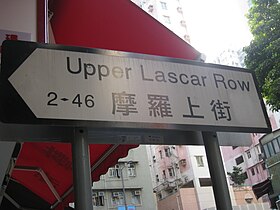Lascar Row
 Street sign in Sheung Wan | |||||||||||||||||||
| Native name | 摩羅街 (Chinese) | ||||||||||||||||||
|---|---|---|---|---|---|---|---|---|---|---|---|---|---|---|---|---|---|---|---|
| Maintained by | Highways Department | ||||||||||||||||||
| Length | 225 m (738 ft) Upper Lascar Row: 168 metres (551 ft) Lower Lascar Row: 57 metres (187 ft) | ||||||||||||||||||
| Other | |||||||||||||||||||
| Known for | Antique Market | ||||||||||||||||||
| Status | Pedestrianized | ||||||||||||||||||
| |||||||||||||||||||
Lascar Row is the combined name of two streets between Hollywood Road and Queen's Road Central in Sheung Wan, Hong Kong, Upper Lascar Row (摩羅上街) and Lok Ku Road (Historically Lower Lascar Row). The immediate area is notable for its antique stalls.
Name[edit]
Although 摩囉 is not in the Chinese dictionary, its meaning stems from the English word lascar. Derived from the Persian lashkar (military camp), it was used by the British to refer to Indian seamen. The word 摩囉 comes from "Musselmen", Muslims from the Middle East who traded in China. The name row derives from the row of houses that served as accommodations for Indian seamen.[1]
Other names[edit]
The Indian community formed a mini market, which provided a place for Indians to trade at ease. Since the 1920s, it gradually developed as a market for a wide range of antiques, including obsolete electronic appliances. It therefore gained the name "Antiques Street", along with the neighbouring Hollywood Road.[2][3]
Cat Street (貓街) derives from the sale by some shops of stolen goods, known as "mouse goods" (老鼠貨) in Chinese. With its lower prices, many were attracted to shop in the area. Shoppers who walked cautiously down the street while selecting their goods were likened to cats trying to catch a mouse. Foreigners, particularly, came to refer to Lascar Row as Cat Street.[4][5]
Upper Lascar Row[edit]
Upper Lascar Row is a narrow alley in Mid-Levels which runs parallel to Hollywood Road on the north side. The straight alley measures over 500 feet (150 m), and there was an Indian police dormitory in the street. On 11 February 1911 a fire broke out on Upper and Lower Lascar Row, destroying 16 houses and damaging another 24.[6]
History[edit]

In Chinese, it is common to use "摩囉" to describe Indians. At the beginning, it did not contain any derogatory sense.[7]
Shops and products[edit]

Hollywood Road and Upper Lascar Row's antiques shops have copper mirrors, electric fans, jade gems, watches, ancient coins, Qing dynasty vases, stamps, newspapers and calendars.[8]
Renaming request[edit]
In 2010, eight district officers from the Central and Western District expressed the objection by South Asians to the Cantonese word 「摩羅」 and asked the Hong Kong government to consider changing the name of the street.[citation needed] However, the Lands Department decided not to do so.[7] It ruled that it did not find the word offensive to South Asians. According to some officers, the refusal reflected government indifference to discrimination against ethnic minorities.[citation needed]
The Democratic Party criticised the government for not considering the sensibilities of South Asia, saying that the term is pejorative. According to the government, a name change would diminish the alley's historical value and the word Mouro is neutral. Inconvenience was also cited, since the street name "Upper Lascar Row" has been used for more than a century. Public input was suggested before any name change.[9]
See also[edit]
References[edit]
- ^ 香港街道命名考源. 市政局刊物.
- ^ 穿街過巷香港地. 香港: 恩與美文化基金.
- ^ Chiu, chen-pong. (2009)
- ^ 穿街過巷香港地. 香港: 恩與美文化基金.
- ^ Chiu, chen-pong. (2009)
- ^ Section 43 "fires" of appendix P Report of the director of Public Works for the Year 1912 of the Hong Kong Government Gazette.
- ^ a b Lim, Lisa (3 March 2017). "Where the word lascar, and Cantonese mo lo, come from, and the case for changing a Hong Kong street name". South China Morning Post. Retrieved 6 June 2022.
- ^ Niu, Ru-chen. (1998). 香港全覽. Bet-Jing: Dong Fang Chu Ban She.
- ^ "Y Y - nȸǤQ[ ijPùW". nȸǤQ[ ijPùW - Y Y. Retrieved 29 July 2015.
Further reading[edit]
- Cheung, Chi-Yi. 圖說香港昔日情. 香港:經要文化.
- Cheung, Chi-Yi. 圖說香江歲月. 香港: 一點文化.
- Leung, Beng-Wa. 中西區風物誌 ("Heritage of the Central and Western District, Hong Kong"). 香港: 中西區臨時區議會.
- 香港攝影熱點王. 香港:數碼雙周.
- Go, King. 閱讀香港. 廣東:廣東人民出版社.
- 香港街道命名考源. 市政局刊物.
- Chong, Man-lork (1999). 歲月留痕 (As Time Goes By). 香港: 利文出版社.
- Niu, Ru-chen (1998). 香港全覽. Bet-Jing: Dong Fang Chu Ban She.
- Chiu, chen-pong (2009). 穿街過巷香港地. 香港: 恩與美文化基金.
External links[edit]
- 17 June 2010. hkheadline.com.
- HK-94. 681busterminal.com.
